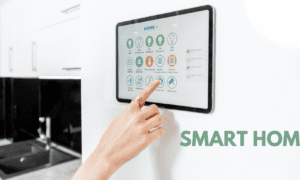Smart home technology can transform the way you live while cutting energy consumption costs and improving security and convenience in the process.
Home automation makes controlling lights, appliances and other devices much simpler with smartphone control of lights and appliances as well as helping reduce energy costs by monitoring how much electricity each appliance uses and commanding those that consume too much to use less power.
Home automation
Home automation is a technology that enables devices to communicate over the Internet. This technology can assist homeowners in carrying out everyday tasks such as locking their front door, setting their thermostat or turning on lights remotely.
Many smart appliances can learn their owner’s schedule and adjust accordingly, saving energy and lowering bills in this way.
Technology such as this is also beneficial to elderly, providing remote monitoring of their homes to reduce the risk of wandering away from home and protect them against break-ins by sending alerts if someone enters without authorization.
Home automation offers many advantages, yet it also has potential drawbacks. Hackers could access your system and disable alarms or lights – leaving your home vulnerable and open for attack.
Energy efficiency
Smart homes utilise Artificial Intelligence to learn a homeowner’s habits and adjust settings to increase efficiency, reduce energy consumption, and ultimately decrease household energy costs and emissions while simultaneously providing comfort, convenience, and security.
Reducing energy bills by 25-30% with energy-efficient appliances and renovations can result in savings up to 40%. Furthermore, many utilities provide rebates on certain efficient technologies, such as fuel-efficient air conditioners and LED light bulbs that could increase savings while decreasing your carbon footprint.
Energy-saving devices can be integrated into a home’s automation system to give residents remote control of appliances and lights from smartphones or tablets. A homeowner could for instance schedule the lighting to automatically turn on and off at certain times of day or set their thermostat temperature according to schedules.
Security
Smart home technology provides many advantages to homeowners, including convenience and comfort, energy efficiency, new spaces, and security. It can even assist in fulfilling daily tasks of a homeowner, such as monitoring alarm system status or making sure kids arrive home safely from school.
While these devices may initially cost more than you expect, their initial investment can quickly pay for itself in terms of lower energy bills and improved lifestyle benefits. Plus, smart tech may play a vital part in getting top dollar for your property when selling.
Smart home technology can also bolster security by enabling you to monitor your house remotely while away. Motion sensors and smart cameras can detect when someone enters or leaves your home while smart alarm systems alert local police if suspicious activity is detected. Some devices even send notifications directly if something seems amiss in your property.
Comfort
Homeowner comfort is of utmost importance, from cozy cushions and well-lit living rooms to the latest smart devices and appliances, homeowners are discovering more ways than ever before to make life easier. Thanks to smart home technology, now anything in a household from controlling thermostat settings to watering lawns can be automated with ease – and most gadgets cost relatively inexpensively and don’t require a degree in engineering for installation and operation!
Homeowners ultimately benefit when they select products for their smart home arsenal, knowing they are creating an atmosphere of safety and security in their space. To make things simpler, several companies have joined forces to offer cutting-edge automation products at reasonable prices such as Dome, First Alert, Ecolink and GE – saving homebuyers time and money while giving them peace of mind.



































